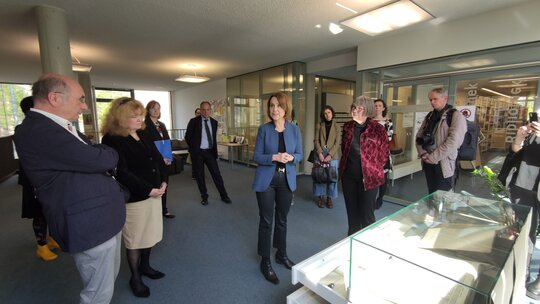High-ranking visitors always seem a little reserved or wait-and-see when they pass through the security gate of the Hochschule für Jüdische Studien (HfJS) in Heidelberg's Landfriedstraße. However, this uncertainty quickly gives way to a feeling of being welcome in this small academic cosmos. This was also the case for Minister Petra Olschowski, who was impressed by the warm welcome. During her visit to the university on Thursday morning, she learned that the HfJS is now the largest institution of its kind in Europe with over 100 of its own students and at least as many participants in university programmes, as well as 20 lecturers, and also has joint doctoral rights with the University of Heidelberg. The spectrum of chairs ranges from Bible and Talmud to history, philosophy, literature, art and linguistics to Israel and Middle East studies.
Science Minister Petra Olschowski emphasised: "The University of Jewish Studies is unique in Germany in terms of its structure and orientation. No other place offers students and researchers such a comprehensive and intensive engagement and academic dialogue with all facets of Jewish religion, history, cultures and societies. The state government is grateful that Baden-Württemberg is home to this important university!"
"We benefit from small things on a large scale," says Rector Professor Dr Werner Arnold. "Far removed from the anonymity of large institutions, we are all about working together on a daily basis, while at the same time our students can benefit from the many collaborations with foreign academic institutions and not least Heidelberg University."
Olschowski was also interested in the experiences of the Campus Rabbi Shaul Friberg. He has been working at the HfJS since 2008, and his monthly Shabbat celebrations are now so popular that he has to ask for bookings in advance so as not to exceed the available space.
After an in-depth discussion with students and at the end of the visit, two professors explained their current research projects, which offer new perspectives and approaches for a wide range of disciplines.
Professor Dr Hanna Liss presented two long-term edition projects and explained their integration into the field of Digital Jewish Studies and Digital Humanities. The first project deals with the Masoretic glossing of northern French and German medieval Bible manuscripts and the recognisable influence of Christian book illumination and architecture. The second project deals with Hebrew-French Bible glossaries as exceptional witnesses to a simultaneously developing (Jewish and Christian) French (Bible) reading culture in medieval Western Europe. The results obtained here already shed new light on the European history of the biblical text and its Jewish interpretation and provide important scientific impulses not only for Jewish studies, but also for the various theologies, medieval art history and the medieval history of knowledge.
The topic of "blood" is the focus of Rabbi Prof. Dr Birgit Klein's research project: "'Blood is a very special juice!' - Medical, historical and ethical-religious considerations from the perspective of Judaism", which she is conducting together with her project partner, the haematologist and oncologist Prof. Dr Michael Schmitt, at the Marsilius Kolleg of Heidelberg University. Blood has lost its ritual function in Judaism since the end of ritual sacrifices following the destruction of the temple in 70 AD. There is evidence that blood has been used therapeutically as a remedy since the late Middle Ages in a way that can be considered medically justified according to current knowledge. As Klein emphasised, it is therefore justifiable from a Jewish perspective if genetically modified T-cells and stem cells from blood preparations are used to treat leukaemia and other cancers, according to the project partner at the University of Heidelberg. The interdisciplinary approach of the project also makes it possible to discuss the ethical and religious implications of dealing with blood products, transplantation and genetic engineering.



![[Übersetzen nach: English] [Übersetzen nach: English]](/fileadmin/_processed_/4/9/csm_Judaephobia_9b7df4f2b0.jpeg)

